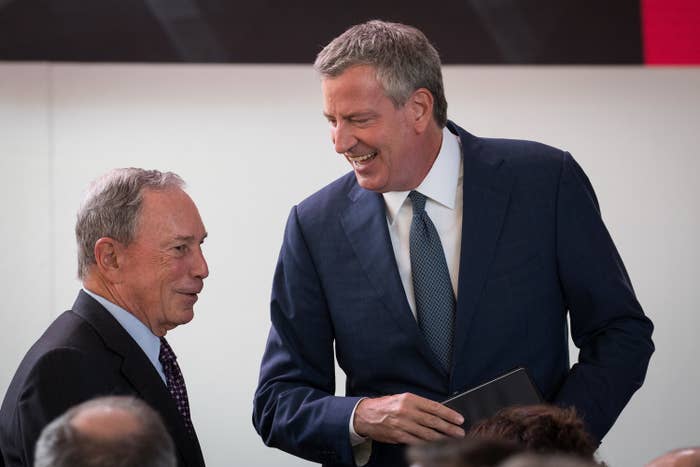
Former New York City mayor Mike Bloomberg apologized on Sunday for the stop-and-frisk policing that peaked during his mayoralty and predominately impacted the city's minority communities.
Current New York City Mayor Bill de Blasio is not really buying the apology.
“It’s hard to believe when his approach has been proven wrong so many times and in so many ways,” de Blasio told BuzzFeed News in a phone interview Sunday night.
Bloomberg's apology comes as he's considering a late entrance into the Democratic presidential primary, after filing to appear on the ballot in two states in recent weeks. De Blasio ran in the primary earlier this year, before ending his campaign in the fall.
“He was wrong because he never listened. He didn’t even acknowledge the validity of concerns, again as part of his often haughty nature. He was wrong because the rift that was created was totally counterproductive and was hurting any potential for partnership between police and community,” de Blasio said.
At a Brooklyn church on Sunday, Bloomberg said he was "wrong" for relying on stop-and-frisk policing, in which NYPD officers stop and pat-down people they determined to be suspicious. And he apologized for the impacts the stops had on the city's minority communities.
“Our focus was on saving lives,” Bloomberg said. “But the fact is, far too many innocent people were being stopped while we tried to do that. And the overwhelming majority of them were black and Latino. That may have included, I’m sorry to say, some of you here today, perhaps yourself, or your children, or your grandchildren, or your neighbors or your relatives.”
De Blasio said the timing Bloomberg's apology had an "obvious convenience."
“If he had said something while he was still mayor, if he had said something in the aftermath of his mayoralty, if he had said something after my first year or my second year when we got rid of it and drove down crime, that would’ve been a natural point to say, ‘uncle,’ you know? It’s like, ‘You got me, I was wrong.’ No, he kept defending it,” he said.
In August 2013, a federal judge ruled that the NYPD's stop-and-frisk practice violated the rights of the city's minorities, saying the city was using a “policy of indirect racial profiling.” Bloomberg at the time appealed that decision, which he said “makes our city a more dangerous place”; the appeal was dropped under de Blasio. But the number of stops began to decline dramatically in the second half of 2013, Bloomberg's last months in office.
De Blasio attributed the start of that decline to the growing movement against the policing tactic in the city, including the 2012 "Silent March," which he took part in. And he also cited both the 2013 court decision and that year's mayoral campaign.
Stop-and-frisk, de Blasio said, "was a horrible failure, and that was visible early in his third term. So I do think all of us put a lot of pressure on, and they started to back away. But they never renounced it and they still kept it on at a pretty high level.”
Bloomberg had defended stop-and-frisk policing as recently as earlier this year, when he credited the practice with cutting the city's murder rate.
Stops have continued to drop since de Blasio became mayor. But despite warning from Bloomberg during his mayoralty that halting stops would result in increased crime, the city's crime rate has dropped along with the number of overall stops. In 2013, the NYPD recorded 191,851 stops, according to the New York Civil Liberties Union. In 2018, the NYPD recorded just 11,008 stops.
However, according to the NYCLU data, big racial disparities have persisted in who in the city is stopped by police. In 2013, 56% of those stopped were black and 29% were Latino. In the first half of this year, out of 7,101 recorded stops, 60% of those stopped were black and 29% were Latino.
“I say we absolutely have more work to do," de Blasio said about the ongoing disparity. "So I want to model the behavior here. I say I wish Bloomberg had listened to communities and listened to reformers. I try consistently to do so. So if folks say there are still disparities we need to work on, I say you’re right.”
De Blasio argued that stop-and-frisk was just one part of a "pattern" of ignoring the "grassroots" and community concerns during Bloomberg's administration, particularly on policing in general.
"You think of the things that Bloomberg didn’t do in his time that there were already established concepts," de Blasio said. "He didn’t do implicit bias training for the NYPD, we did that. He didn’t do deescalation training, we did that. He didn’t do body cameras, we did that. So there was no serious interest in police accountability and police reform.”
De Blasio, who did not find much of any traction in the Democratic primary this summer, is skeptical Bloomberg will find much of a way into the presidential race should he decide to join it, in part because he's only been a registered Democrat since last year. But he raised particular concerns about Bloomberg's wealth.
“There’s not a lot of warmth in the United States of America for billionaires,” he said.
Politicians who are wealthy enough to self-fund their own campaigns, de Blasio said, "are inherently dangerous." Bloomberg in New York "was able to effectively buy elections, and didn’t need to engage communities and constituencies. So the elites saw it as noble independence, but in fact baked in the status quo further.”
